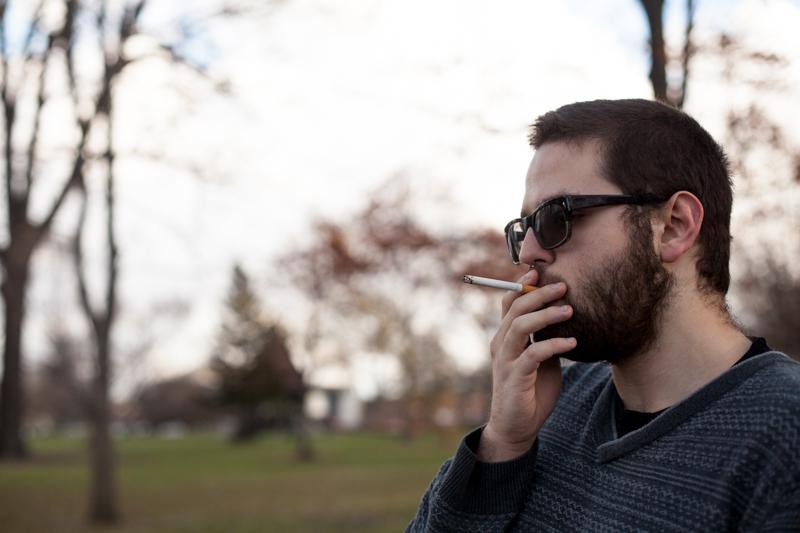Tobacco Ban Enforcement Remains Unclear
College sophomore Carlos Armstrong smokes a cigarette in Tappan Square. The public park will become a designated smoking area for students after the College implements the tobacco-free policy on July 1, 2016.
November 20, 2015
As the College inches closer to July 1, 2016, the day the tobacco ban goes into effect, it remains unclear how the ban will play out in practice.
“Exactly how the ban will be enforced is extremely vague,” said Jordan Ecker, College junior and Implementation Committee member. “No one has any concrete idea of how to enforce the ban. Safety and Security have more important things to do and ResEd doesn’t want RAs policing their residents’ behavior.”
According to Ecker, the committee also has yet to determine how they will codify the tobacco ban into the judicial system.
The tobacco ban will affect all property and vehicles owned by the College but will leave Tappan Square as a designated smoking area for two years. The ban will include cigarettes, chewing tobacco and any other smokable and non-smokable forms of tobacco. According to Ecker, the College also plans to remove all of the ashtray stands from campus.
The Office of Wellness and the Tobacco-Free Implementation committee cosponsored an informational session on smoking cessation resources on Thursday. Only the Review was in attendance.
At the meeting, the Implementation Committee emphasized that for this ban to work, the community needs to take ownership. The committee wants the ban to be educational, not punitive. Student Health is offering free counseling, short-term psychiatric treatment and a free quitting starter kit for students. Student Health will also help students come up with a plan to quit.
But if Thursday’s non-meeting is any indication, not every student may be interested in quitting. So far, only four or five students have approached Student Health for help quitting smoking.
The policy was suggested by a committee in 2010 in response to a national trend on college campuses to go tobacco-free. In the spring of 2014, Student Senate voted for the policy, and in the fall it was approved by a general faculty vote. President Krislov then appointed an implementation committee to begin assessing the campus’ readiness to go tobacco-free.
The Committee’s survey found that 16 percent of students already smoke cigarettes coming into their first year. The percentage of smokers goes up to roughly 20 percent after a few years of being at Oberlin, potentially demonstrating a culture of tobacco use on campus.
The health risks caused by smoking and inhaling second-hand smoke are ample justification for the tobacco ban for some students.
“Basically, I just don’t want to walk through second-hand smoke, and I don’t like the smell,” said College senior Alex Katz, who has repeatedly seen the current 30-foot rule violated. “30 feet seems like an arbitrary number. The problem with smoking is that it doesn’t just stay in the area, it travels in the air.”
Although he supports the new policy, he added that he doubts that people are going to abide by the rules.
The tobacco ban decision was not unanimous and is being met with opposition from some members of the community. One group that does not endorse the policy is the current Student Senate, in sharp contrast to the Senate that voted for the measure in 2014.
According to Senate member and College sophomore Joshua Koller, roughly 13 of the 15 Student Senators voted against the ban in the general faculty vote.
Current Student Senators Cyrus Eosphoros, Kirsten Mojziszek, Daniel Marcelle, Megs Bautista, Jesse Doctor, Anjali Kolachalam and Jack Benson have publicly come forward in opposition to the ban. To them, the ban is an invasion of privacy and autonomy for the student body.
“That’s not something that we think is specific to the tobacco ban,” Koller said. “We are just not in favor of any policy that encroaches upon the autonomy and privacy of any student at the College.”
Koller’s view is common among the student body.
“I think it’s kind of insulting that they think my smoking is going to be solved by counseling,” said Ryanne Berry, College sophomore and Review copy editor. “Cigarettes are legal and it’s a choice for my body, but I understand also that I am technically affecting other people with my choice for my body.”
College sophomore Charlotte Taylor also questioned the wisdom of the ban. “I feel like a lot of people use cigarettes to do their work,” Taylor said. “I also just wonder what they mean by safe. Obviously smoking is bad for you, but I don’t think they really care about my physical health.”
Many members of the community are concerned that this policy is going to hurt the already weak relationship between the town and the College.
“I don’t go to the College, but I do enjoy the College’s resources, and if [the ban] in any way impedes that, it’s going to make it harder to feel welcome in a lot of ways,” said Jessica Bott, an Oberlin resident and employee at Agave Burrito Bar & Tequilaria who spoke to the Review on her smoking break. Her main concern was with the potential for unequal enforcement of the policy. “I feel like they are going to give a slap on the wrist if you are a College student, … but are we going to get a fine? Are they going to call the cops on us because we are technically trespassing?”





















